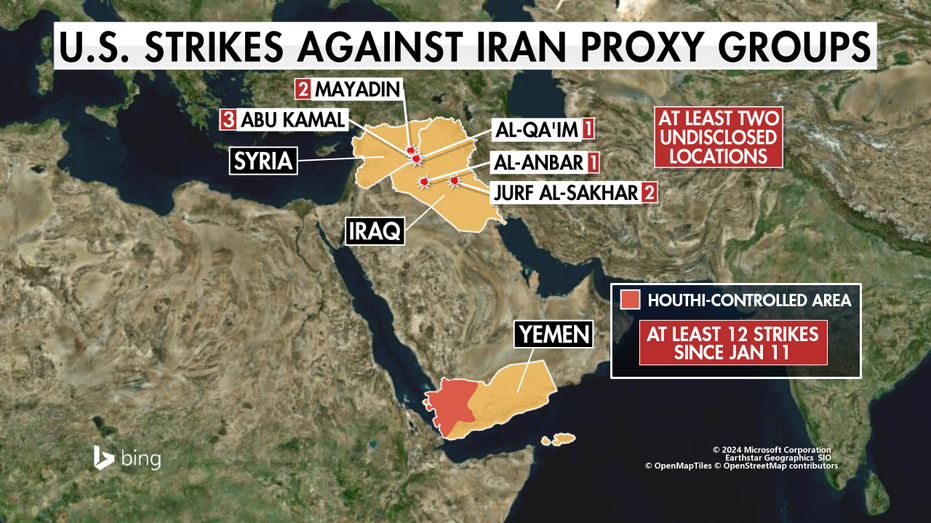The White House stressed Friday evening that the United States is “not looking for a war with Iran,” saying the retaliatory strikes carried out in Syria and Iraq were designed to “de-escalate” tensions and “put an end” to attacks on U.S. troops in the region.
The United States began retaliatory strikes on more than 85 targets in Iraq and Syria against Iran’s Islamic Revolutionary Guards Corps (IRGC) Quds Force and affiliated militia groups and proxies.
US BEGINS MIDDLE EAST AIRSTRIKES IN RESPONSE TO DEATHS OF THREE SOLDIERS
The strikes come in response to the deaths of three U.S. service members last Sunday on a U.S. base in Jordan.
White House National Security Council Coordinator for Strategic Communications John Kirby stressed that the United States is not seeking conflict with Iran or in the Middle East, but explained that the strikes that began Friday evening “will not end” tonight.
Kirby said the targets were carefully selected to avoid civilian casualties and based on irrefutable evidence they were connected to attacks on U.S. troops in the region, adding that the Iraqi government was informed before the strikes were launched.
Kirby and Lt. Gen. Douglas A. Sims II said the strikes were initiated Friday, and not sooner, due to weather, explaining that U.S. officials have been “waiting for the weather to cooperate,” and saying that Friday posed “the best opportunity” with regard to conditions.
“We feel really confident about the precision of those targets,” Sims said during a call with reporters. “We hit exactly what we meant to hit.”
Sims explained that waiting for the right timing with the weather allowed the U.S. to avoid “any unnecessary casualties.”
“The weather did turn today to allow us to conduct these strikes and as a result, we’re very confident in the targets that we struck today,” Sims said.
When asked if the timing of the strikes had anything to do with Friday’s dignified transfer of the remains of three troops killed in the Iran-backed militia attack in Jordan at Dover Air Force Base in Delaware, Kirby said no.
“It had no connection whatsoever with the dignified transfer at Dover,” Kirby said.
BIDEN ATTENDS DIGNIFIED TRANSFER OF FALLEN TROOPS KILLED IN JORDAN DRONE ATTACK
But Kirby explained the strikes were meant to “send a signal,” and that signal was to those who “seek to bring Americans harm.”
“We do not seek a conflict with Iran,” Kirby said. “These targets were chosen to degrade and disrupt capabilities of IRGC and groups they sponsor and support.”
Kirby said “the goal” of the strikes is “to get these attacks” on U.S. service members in the region “to stop.”
“The signal is the attacks have to stop,” he continued. “These facilities were being used by IRGC and their proxy groups to conduct attacks on U.S. personnel in the region.”
He added: “These responses began tonight—they are not going to end tonight. There will be additional responses, additional action we will take, all designed to put an end to these attacks.”
When pressed, Kirby said: “We are not looking for a war with Iran.”
“If you are taking away capability of an adversary who is trying to kill your troops and act against your interest in the region—if you are trying to take away their capability then, you are, by default, working to de-escalate tensions and that is our approach here,” Kirby explained.
Meanwhile, Kirby said he would not “telegraph future operations,” but stressed that there will be “additional response actions taken in coming days.”
“Today, we saw the first set of responses,” he said. “It will not be the last set of responses that you see.”
Kirby again stressed that the United States “does not want to see a single more attack on U.S. troops or facilities in the region. We don’t want to see a single one more.”
“We want attacks to stop,” he said. “We want them to stop right now.”
There have been at least 160 attacks on U.S. troops in the Middle East since mid-October.
President Biden previously said that he holds Iran responsible for the most recent attack last week because they supplied the weapons to the people who perpetrated it, but he also noted that he does not wish to escalate tensions with the Islamic Republic.
The 85 targets included command and control operations, intelligence centers, militia group’s rockets, missiles, unmanned vehicle storages and supply chain facilities, CENTCOM said.
The fallen troops after last weekend’s attacks were Sgt. William Jerome Rivers, 46; Spc. Kennedy Landon Sanders, 24; and Spc. Breonna Alexsondria Moffett, 23, all of whom were from Georgia.
























